
Thrown into a war she had hoped would never happen, one journalist has found herself haunted by her experiences in Nagorno-Karabakh, and determined to prevent their return.
It was a summer evening, music was playing softly in Dedaena Park in Tbilisi, barely disrupted by the sound of glasses clinking nearby. A group of our fellow students from the journalism faculty of the Georgian Institute of Public Affairs came to unwind after a long day of exam preparations.
As we enjoyed the relief of a light breeze after the unbearable afternoon heat, fireworks began to explode loudly in the sky near us — a common occurrence in Tbilisi. I noticed that Hermine Virabyan, my classmate from Armenia, had covered her ears with her hands and started to shake. When I asked her if she was ok, she muttered something inaudible and asked me to step aside with her. We sat down on the grass and, wiping her tears, she decided to tell me the story of a trauma that, as is often the case with Armenians and Azerbaijanis, was related to war.
‘The war was already going on when I was born’, Hermine says. ‘My parents decided to have a child in a country that was at war and they didn’t seem to think about the consequences that I and my generation ended up facing.’
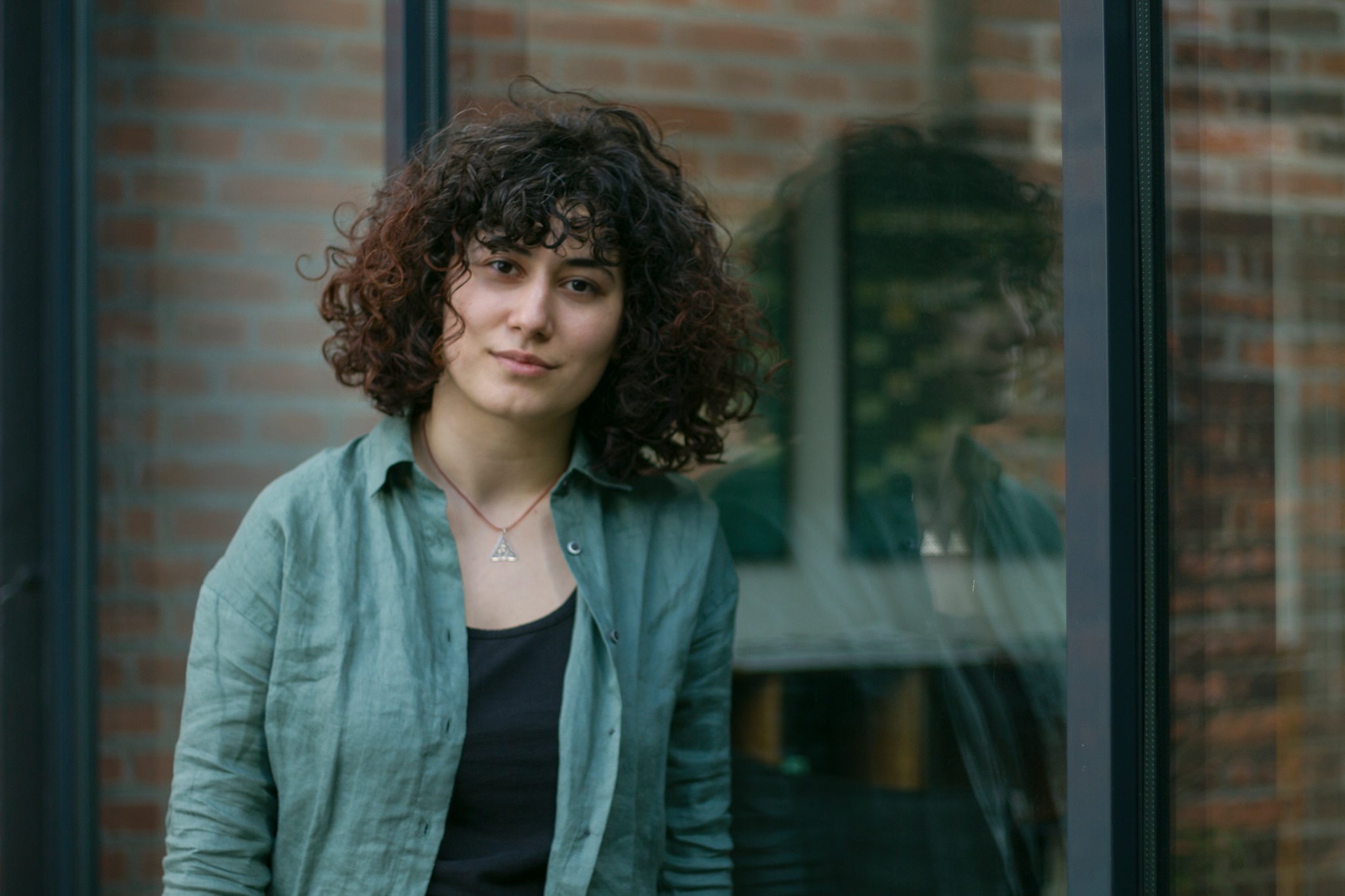
According to Hermine, she was taught to hate Azerbaijanis at school, but over the years she learned more about the conflict, travelled, and interacted with Azerbaijanis, she realised how much Armenians and Azerbaijanis had in common.
‘It was painful to realise that we are so similar and yet hate each other so much.’
‘Not the best Sunday morning’
On 26 September 2020, many in Azerbaijan and Armenia did not suspect that a war was about to begin. Others, aware of the possibility, persisted in the hope that it would not happen. People continued to live their lives peacefully until the early hours of 27 September, when Azerbaijani troops attacked Nagorno-Karabakh.
Hermine was no exception. On the eve of the war, she was at a house party with friends in Armenia.
‘We had fun all night playing Monopoly’, recalls Hermine. ‘Waking up in the morning, I saw that my friends were standing in the kitchen. Everyone was reading the news — the war had begun. I couldn’t believe that it was actually happening. One of the guys said, “This is definitely not the best Sunday morning” ’.
Two days later, Hermine received a call from a colleague saying that a group of journalists from Le Monde needed a fixer in Nagorno-Karabakh: could she accompany them? Her task would be to travel with them, arrange interviews with local residents, and act as an interpreter.
Hermine says that while she did not want to be directly involved in the war, she had covered human rights issues, the war’s consequences, and the issues faced by refugees throughout her career. The war was taking place regardless, and this seemed like an opportunity to help draw international attention to the suffering of civilians.
‘Relying on your survival instincts’
After swift preparations, Hermine met with correspondent Allan Kaval and photographer Rafael Yagobzadeh, and they set off to Nagorno-Karabakh. The war had been going on for several days and social media was full of photos and videos of the heavy fighting and shelling taking place in the region.
Hermine says that on the way to the war-torn region, she was filled with a feeling of fear.
‘I had participated in training for war correspondents, but I quickly realised that almost everything we had been taught was useless. I knew how to talk about what was happening, but I did not understand how to physically work in a zone of active conflict. You start trusting your survival instinct, which is not always a good thing’.
The journalists arrived that night in Stepanakert (Khankendi), the capital of the unrecognised republic of Nagorno-Karabakh. Hermine says that they arrived to darkness; the city’s lights had been turned off, so as not to attract shelling.
Almost immediately after their arrival, Hermine and her companions went to a press conference being held by the de facto head of Nagorno-Karabakh, Arayik Harutyunyan.
‘Harutyunyan flaunted at a press conference and constantly spoke about the losses of the Azerbaijani army, that they were allegedly losing. And I thought, “What about the Armenian side? Why don’t you talk about the people who are suffering on this side?” ’
After the press conference, the journalists returned to the hotel where they were going to spend the night, and heard the howl of an air raid siren. Hermine grabbed what she could and, together with the French journalists, ran for cover.
‘I could not believe that all this was really happening — a couple of days ago I was drinking coffee in Yerevan, and now I am trying to get to a bomb shelter”, Hermine recalls. This siren, however, turned out to be a false alarm.
‘Death from above’
On the morning of the next day, foreign and local journalists who arrived in Stepanakert were offered a choice of two cities where they could go to film the consequences of recent shelling — Hadrut and Martuni (Khojavend).
Martuni is a small town with a population of several thousand people. After the end of the First Nagorno-Karabakh War, it ended up near the line of contact between Armenian and Azerbaijani troops.
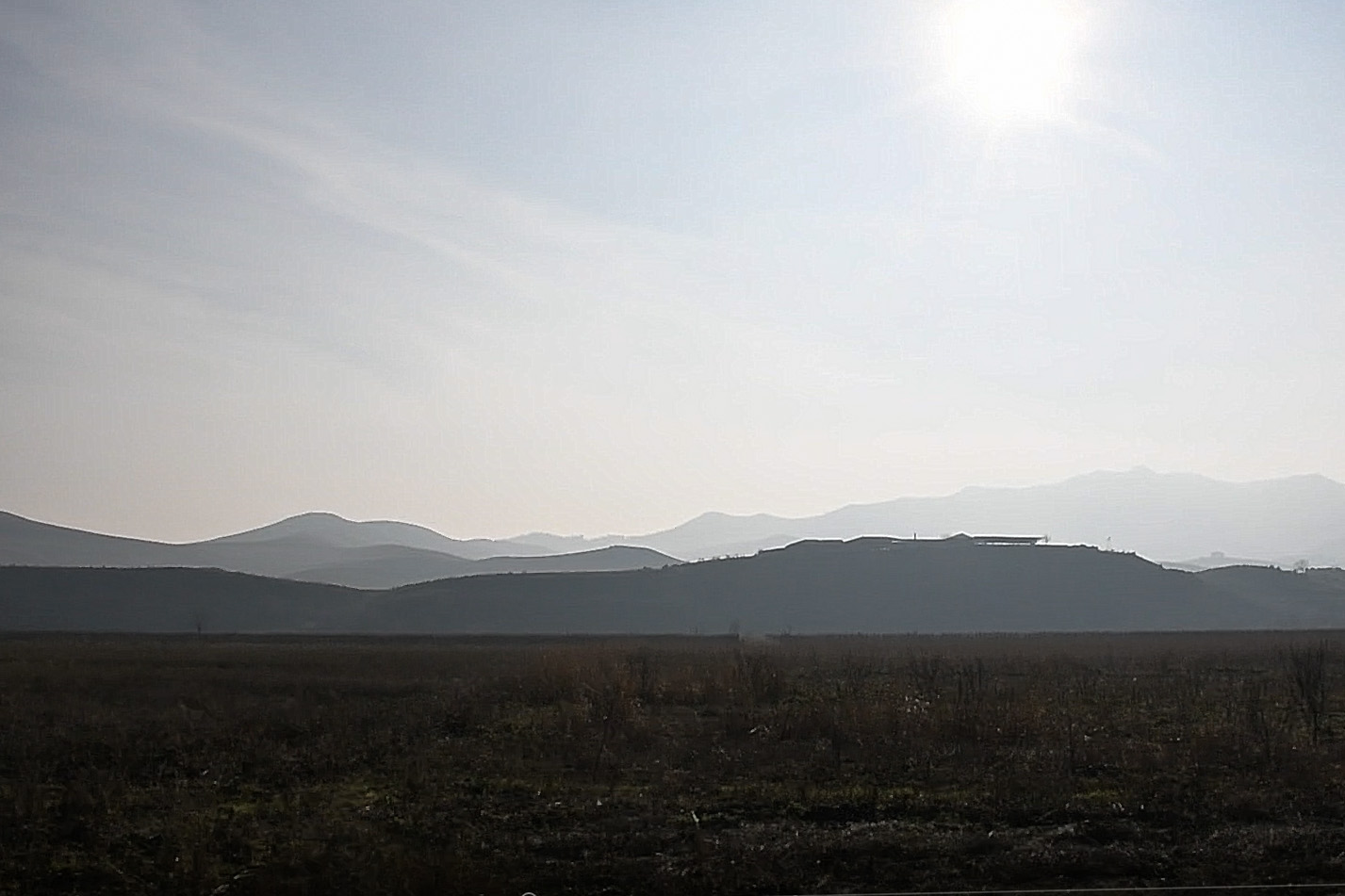
On the first day of the 2020 war, the town was hit by an artillery strike, which, according to Nagorno-Karabakh’s human rights defender, killed a woman and a child. And that is where, on the morning of 1 October, Hermine and the Le Monde journalists went after hiring a local driver, with the intention of taking pictures of houses damaged by shelling and talking to local residents.
According to Hermine, a large group of journalists arrived in Martuni and gathered near the building of the local administration. An official warned the journalist that they would not drive everyone around the city at once, because large groups of people and cars often became targets for combat drones.
While waiting for their turn, Hermine and her companions decided to take a look around on their own, photographing houses and talking to people living in bomb shelters. She recalls that those who could, had left; only men, who were forbidden to leave Nagorno-Karabakh, and those who refused to leave without their sons or husbands remained in the city.
Unlike the French journalists, Hermine did not have a bulletproof vest or a helmet; she says that Armenia was so unprepared for the war that the country lacked protective equipment for the press. Her French colleagues offered their own body armour to her, as they continued to wait for a local guide who would take them to damaged areas of the city.
‘Grisha volunteered to help us — a young guy of about 20, who was standing nearby at the time. He had not been drafted into the army because his brother died in the 2016 war and, according to local laws, he could not be drafted. Grisha decided to stay in Martuni and try to help those who remained in the city. He said he could take us around the city,’ says Hermine.
The journalists got into their car and drove to a street which had recently come under fire. Hermine and her companions went to one of the affected houses; windows in many houses had been shattered by the blast, and there was a lot of broken glass on the floor.
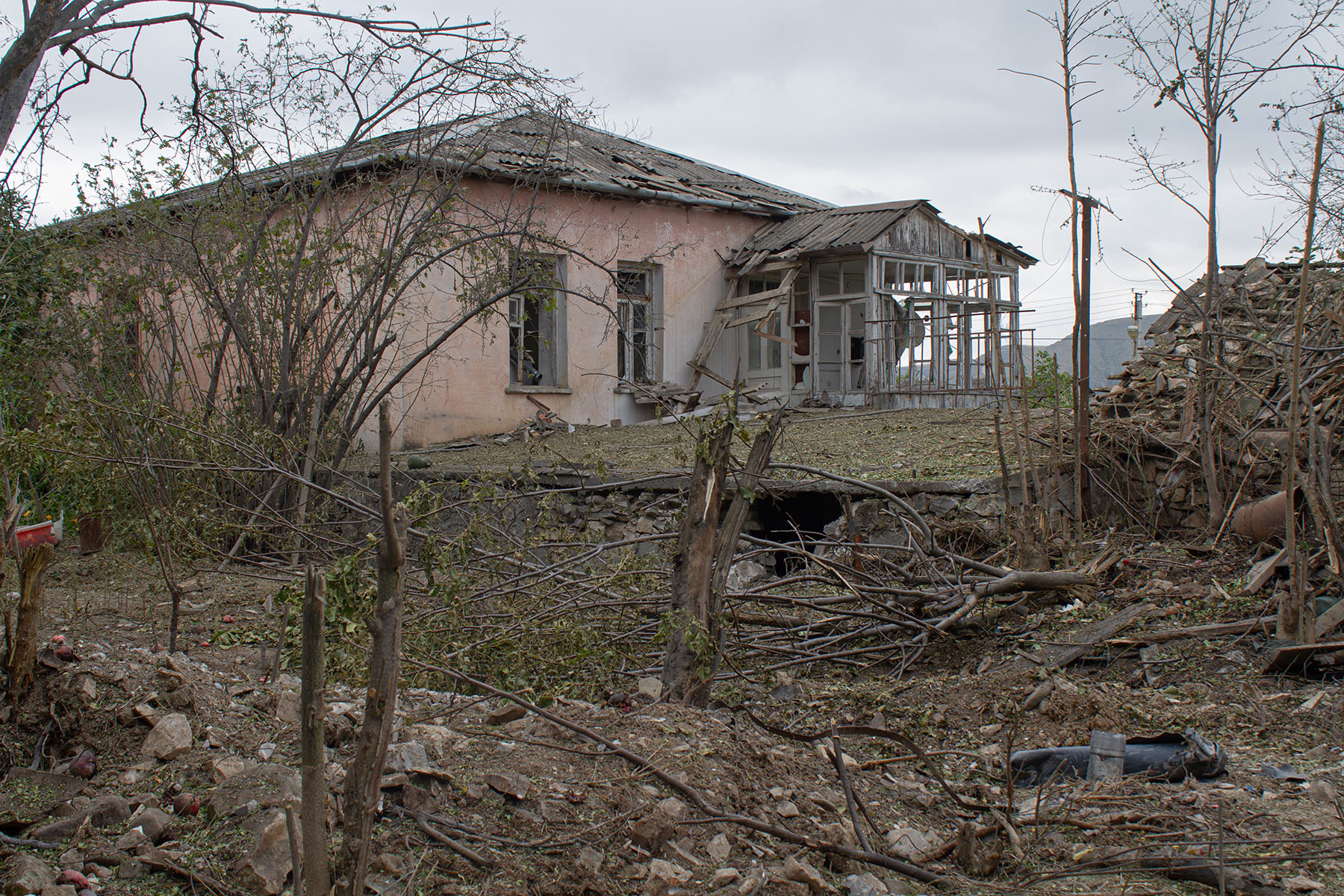
‘Abandoned pets were roaming the rubble, searching for something to eat. Tree branches bowed to the ground from a bountiful harvest. The pomegranates were so ripe that they had cracked open but remained uncollected’, recalls Hermine. ‘We walked through the trees to inspect another damaged house nearby. Between us and this house lay the remnants of previously used weapons. We did not approach, we just looked from afar, photographed everything, and headed out to go to the next house.’
The journalists had finished shooting and were getting into their car when the sound of an explosion ripped through the neighbourhood.
‘We all scattered in different directions. Before that, I could barely move in the heavy body armour, but at that moment I could suddenly run faster than ever before (although later I learned that I should not have done that). Explosions were going off in all directions, there were about ten of them. I later found out that they were shelling us with Grad [a multiple rocket launcher]. The only thought in my head was to find shelter. I rushed to the houses, but all the doors were locked.’
‘Suddenly the explosions stopped. I was in shock and barely aware of what was happening when I heard cries for help behind me and realised that something bad had happened. I turned around and through the black smoke, I saw Allan. He lay covered in blood. I don’t remember what happened next’.
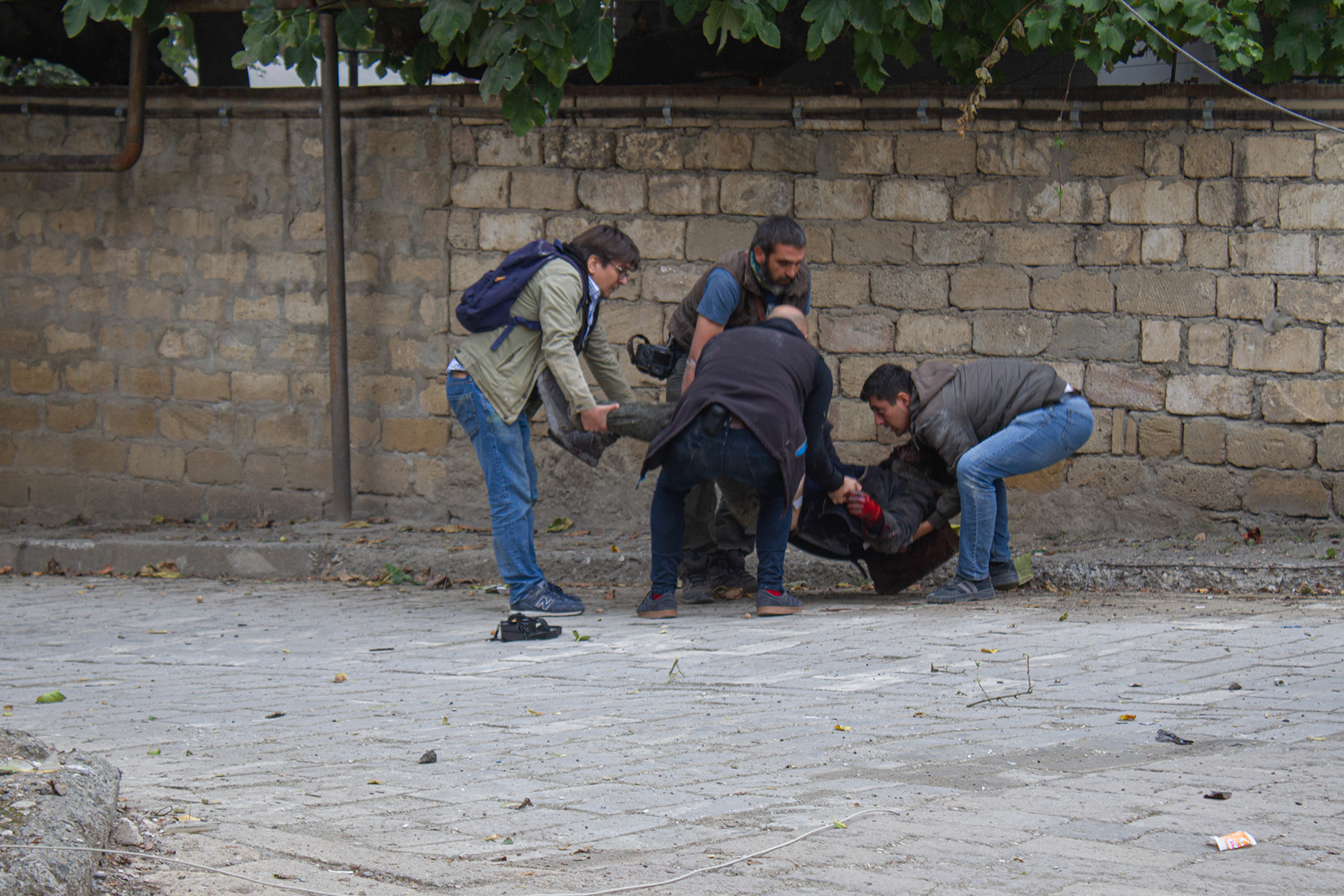
Hermine struggles to recall what happened after she experienced that shelling in Martuni. Only months later was she able to finally piece together the events of that day after watching footage from another journalist, as well as from the stories of other colleagues who were nearby.
‘I was standing there, as if frozen or glued to that one spot, and screamed, calling for help. Rafael had also been wounded in the leg and was lying there bleeding. Other journalists came running, flagged down some cars, and helped take away the wounded.’
Those wounded by the shelling were taken to the basement of a local hospital, where doctors treated them. Hermine called the driver to find out if he and Grisha were okay. The driver was alive, but he couldn’t find Grisha.
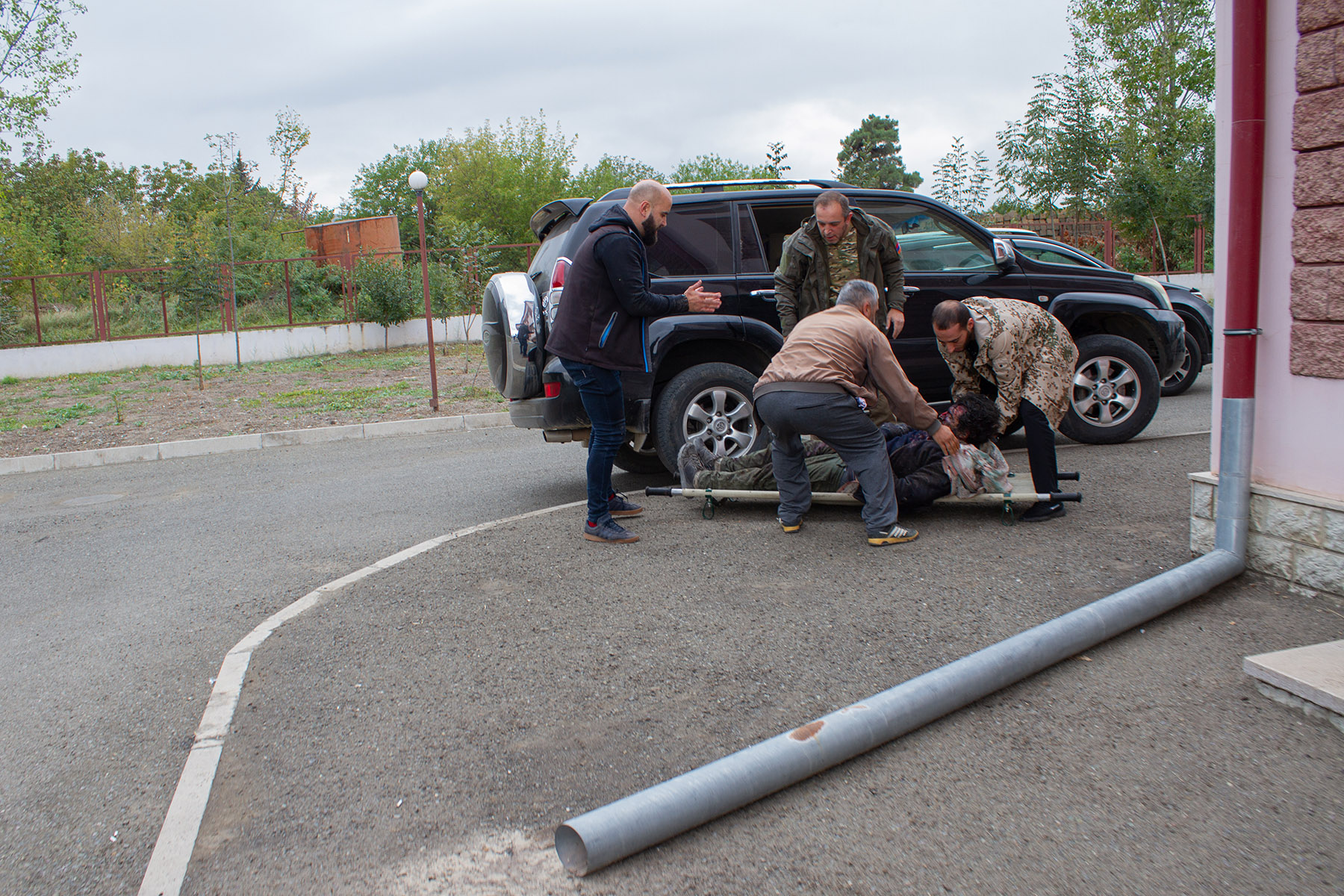
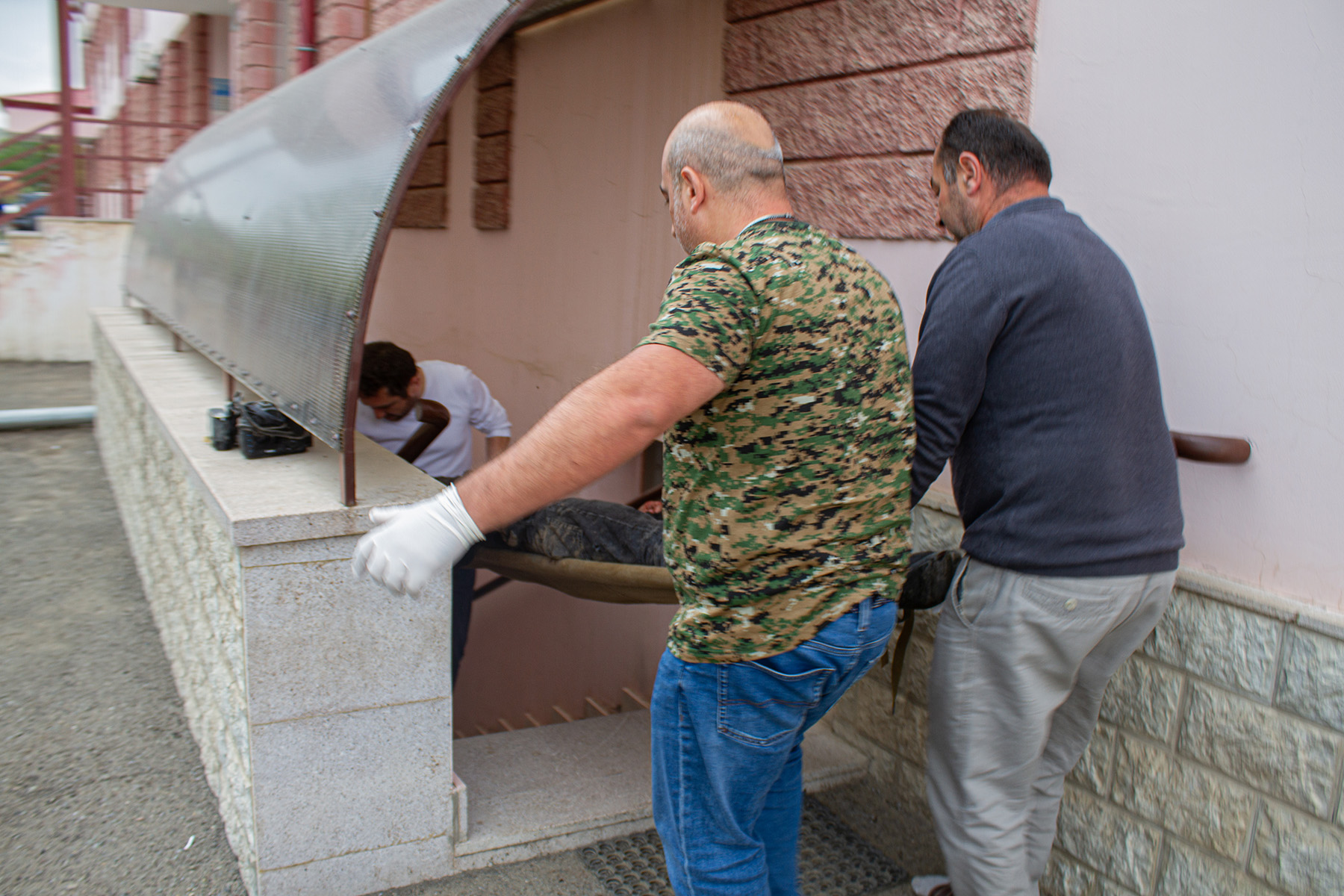
‘When we brought in the wounded, the doctors at the hospital were about to go on their lunch break. They were not yet accustomed to war but quickly organised themselves. The hospital staff did their best, although they themselves were shocked. Some were crying and drinking valerian [a calming herbal tincture]’, Hermine says.
While the doctors were assisting the victims, explosions started to go off again outside. The city was being shelled, and more wounded were brought to the hospital. According to Hermine, the electricity went out several times.
Staff at the Martuni hospital helping the wounded. Photo: Hermine Virabyan.
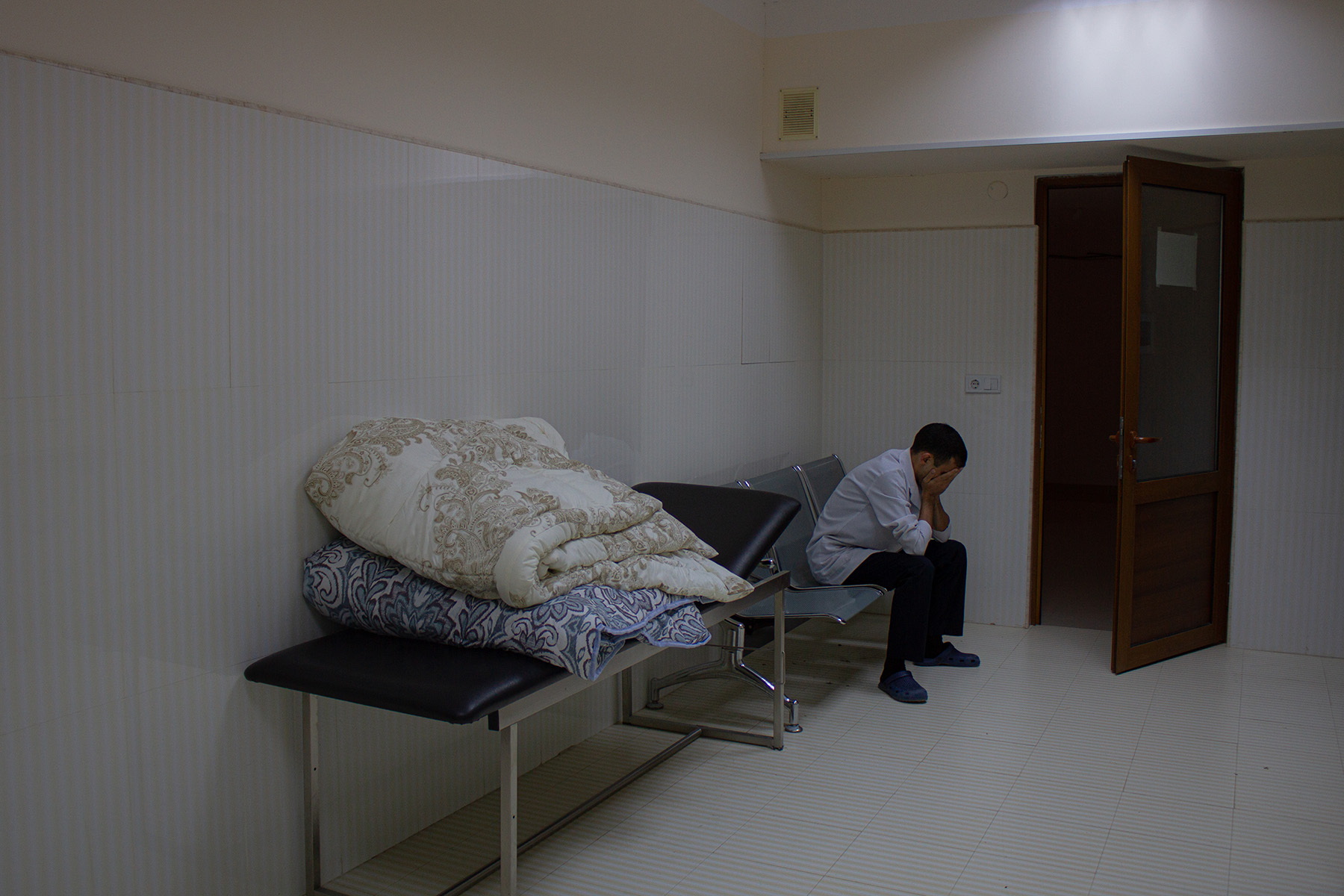
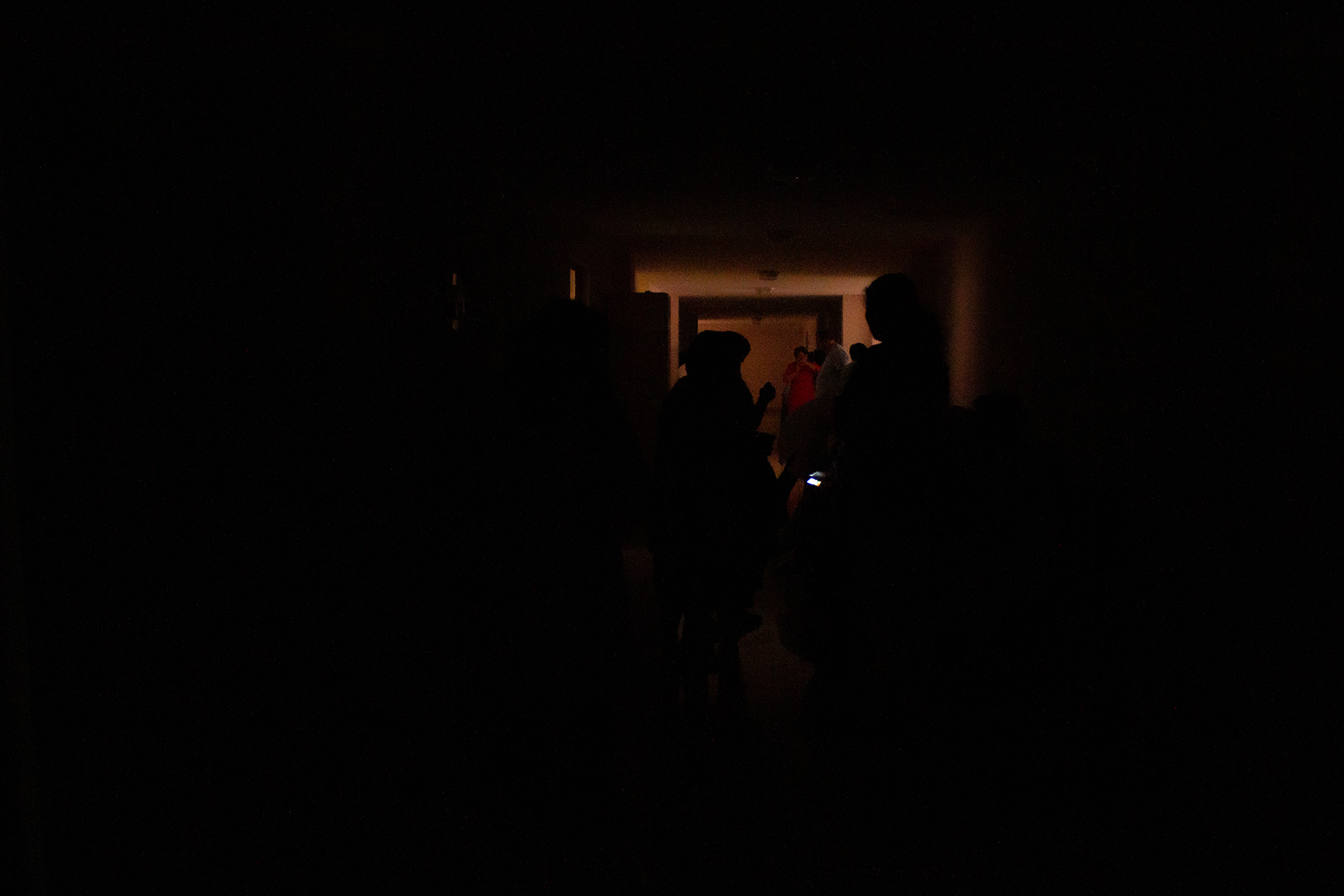
Allan asked to call the French embassy. There was no phone signal, but an Armenian journalist managed to get through to Yerevan and contacted the embassy at Hermine’s request.
News of the injury of the two French journalists was shared by many foreign publications that day. The shelling killed four civilians and injured eleven, including two Armenian journalists.
‘I was still in Martuni when my brother called me and said that he had seen the news and asked if I was all right. Friends called, but I didn’t have time to talk. I ran from one ward to another, checking on Allan and Rafael. The doctor said that Allan was dying.’
‘In the corridor, I heard some men talking — they were looking for Grisha. One of them was his brother. I explained to him as best I could where we had come under fire, and they left to look for him. Later it turned out that Grisha died. He ended up under the rubble, and that’s probably why we didn’t find him right away.’
‘To this day I think about him and cry, blaming myself for his death. I think about how I could have found him and helped him. I feel guilty that he went with us to that street and that we left him there.’
Allan’s condition was deteriorating, and it was decided that he should be taken to Stepanakert for emergency surgery. Martuni was still being shelled, but the doctors decided to take a chance and took the French journalist away in an ambulance.
It usually takes 40 minutes to get to Stepanakert from Martuni, but Allan’s ambulance made the journey in 20, Hermine says. Rafael was operated on in Martuni because his wounds were not as serious.
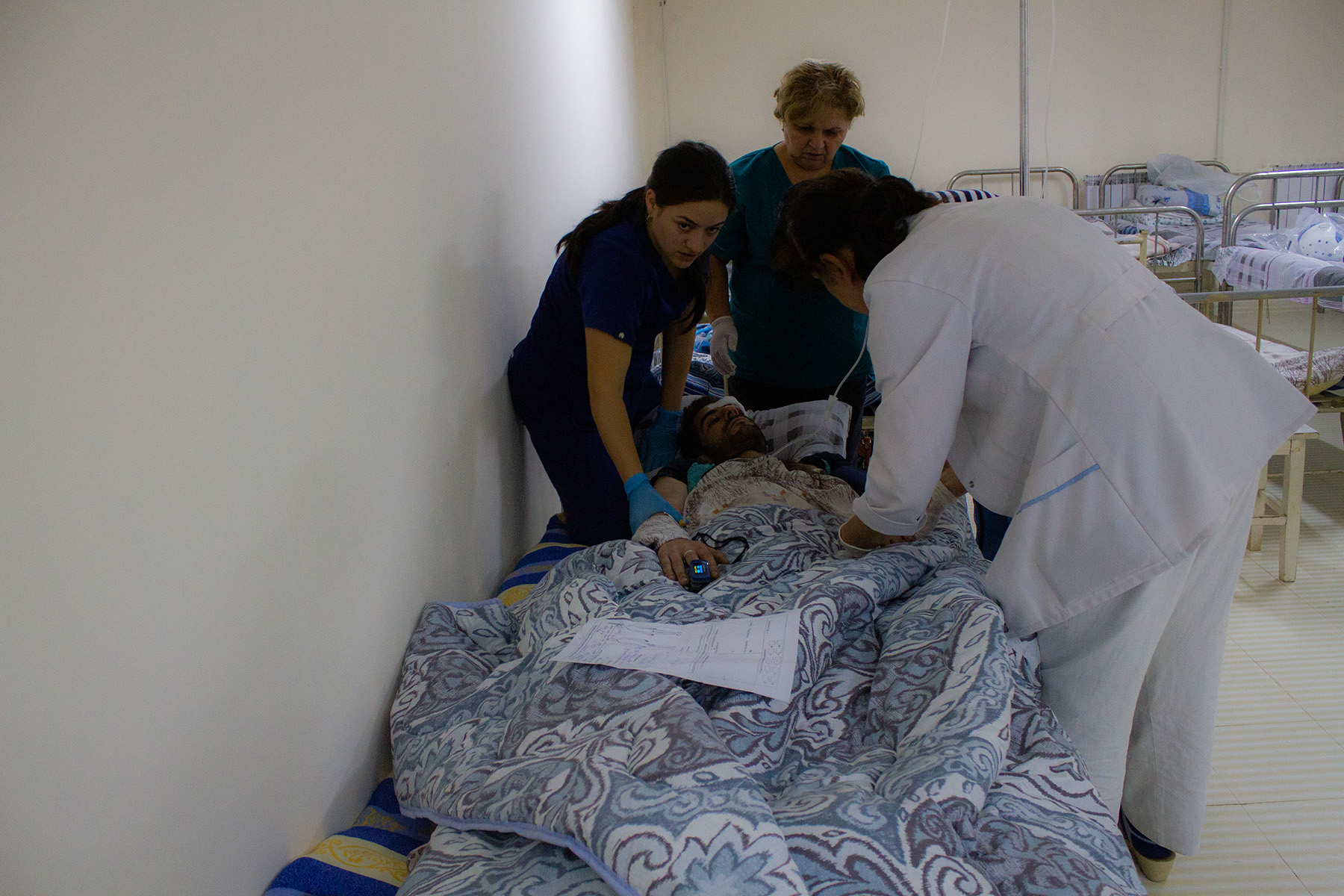
‘A journey back from hell’
The driver who had taken Hermine and the other journalists to Martuni was slightly injured but survived. Hermine made her way to Stepanakert in another car, which safely brought the journalists out of the shelled city.
‘When we left the shelter, I was terrified. It seemed to me that the end of the world had come and if I left the shelter, I would die. Our car was a hundred metres away and I was very scared to walk there.’
‘We arrived in Stepanakert very quickly. I came to the hotel, took our things and found out that the French embassy had already taken care of the evacuation of Allan and Rafael to Armenia’.
Hermine got on a bus which was evacuating civilians from Nagorno-Karabakh.
‘On the bus, I saw crying children and women with horror on their faces, and I realised that in my condition I would not be able to travel with them for seven hours. I wanted to photograph them, but I couldn’t. I couldn’t be inside, so I got out.’
‘At that moment, a family entered the bus — a man, a woman and children. The driver told the man: “the women and children can stay, but you must get out”. I saw the desperation in the eyes of the father of that family and burst into tears. He had to stay and die just because he was a man and he lived in this place; he had to stay and die.’
After a long journey in a car of volunteers who had come to Nagorno-Karabakh to aid civilians, Hermine arrived in Yerevan. She says the car was driving very fast, because everyone was scared, particularly of drone attacks.
‘During one of the stops, the driver went to eat, but I couldn’t. I called a friend, told them everything that had happened, and we both cried.’
‘Two years have passed, but two faces often pop up in my memory — Grisha’s brother and the man who was not allowed to leave with his family.’
‘You must protect your land with your blood’
Hermine reached Yerevan, where her (now ex-) husband met her. At that time, military mobilisation was taking place in Armenia, because the Armenian armed forces were fighting on the side of Nagorno-Karabakh. Hermine’s husband had also been drafted, but he decided not to tell Hermine, who had just returned from the war zone.
‘The next day, when we were having breakfast, he asked me to put down my phone and told me about the draft letter. I sobbed and didn’t know what to do or say. We went to the hospital in Yerevan where Allan and Rafael were being kept, to see them and bring them some of their things. I went inside and there were a lot of wounded young men.’
‘I saw what was happening in Karabakh, I saw many wounded in the hospital. The authorities lied that everything was fine, and my ex-husband was being drafted into the army, but people rejoiced at the war and dreamed of victory. It was terrible to see how they succumbed to the propaganda’, Hermine says.
Two weeks later, her husband received a phone call and was told that in the morning he should appear at the military registration and enlistment office. He had military experience and had done his mandatory service on the line of contact in Nagorno-Karabakh. It was a heavy blow for Hermine.
According to Hermine, in the last few days before her husband left to the front, they tried to live as if there was no war. The couple tried not to read or discuss the news; they just watched movies and spent time together. One day, they were at a fast food place in a shopping centre when the war imposed itself on their lives despite their efforts.
‘We were eating when a patriotic song started playing in the cafe, the title of which can be translated as “You must protect your land with your blood”. We were trying to spend what could have been our last days together as a happy, ordinary couple, but we were told “no, go on and die” ’.
The couple assumed that the military at the front would be forbidden to talk about where they were and what was happening, so they came up with a secret code. For example, “say hello to my sister” meant “I’m fine”. With the help of these code words, Hermine tracked on the map where her husband was.
He survived the war and returned home after it was over.
‘It was one of the happiest moments of my life. He hadn’t washed in over two weeks. When he arrived he was dirty and smelly, but I didn’t care.’
Haunted by the ghosts of Martuni
Hermine began to feel the consequences of her trip to Nagorno-Karabakh shortly after her return. Just a few days later, during a thunderstorm, she felt overcome with an inexplicable sense of fear. She is still afraid of loud sounds, including fireworks.
‘My friends and I celebrated the New Year in Tbilisi. They wanted to watch the fireworks. I didn’t want to go, because I knew how I would react to the loud noises, but I was afraid to look like a bore, so I went. During the fireworks, I put on my headphones, but I was still terrified. I tried not to show it, because people were celebrating and I didn’t want to spoil it’, Hermine says.
The sounds of planes flying at low altitudes also frightened her, especially during the war when they constantly flew over the city. But friends and relatives dismissed her fears and reaction as ‘nothing’, and stated that it would pass.
‘After the war, my ex-husband and I went to Gyumri. We were having a great time and one day we were sitting in a cafe. Suddenly a military plane flew over us very low. I covered my ears and sobbed. It didn’t feel normal.’
‘Strange things started to happen to me. I could be doing ordinary things, like cooking breakfast, cleaning, or going somewhere, and suddenly freeze and be transported in my memories to that street in Martuni where we came under fire. In my mind, I was once again standing there, lost and scared.’
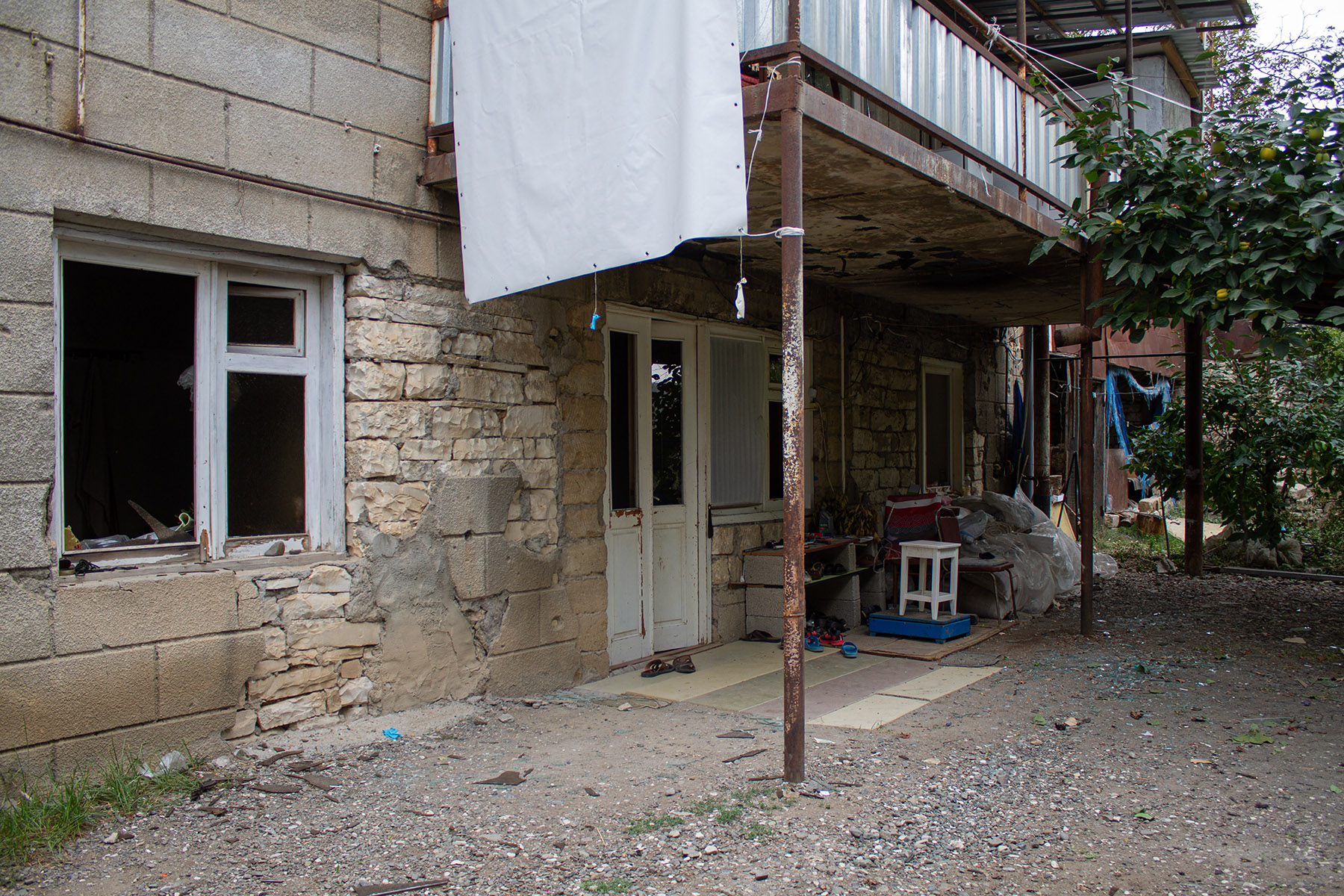
News and footage from Ukraine also make Hermine relive the events of the Second Nagorno-Karabakh War over and over again.
She says the frequency of the flashbacks are now starting to decrease, although they still sometimes haunt her. For Hermine, what is more difficult is dealing with the guilt she feels for Grisha’s death. She believes that he would still be alive today if he hadn’t volunteered to help them.
Hermine began to work with a psychotherapist soon after she returned to Armenia, and has found that the conversations have helped her to accept what happened, although, she admits, not completely. Hermine is afraid to go to Nagorno-Karabakh, but has returned to work as a journalist.
Not long after the end of the war, one media outlet asked Hermine to go to a Syunik Province, on the border with Azerbaijan, to talk to the locals.
‘When I arrived in Goris city, I felt uncomfortable. I was walking down the street and someone launched a drone into the sky to take pictures of the town, and I remember how terrified I was. After our conversation with the locals, I heard shooting in a village right next to the border.’
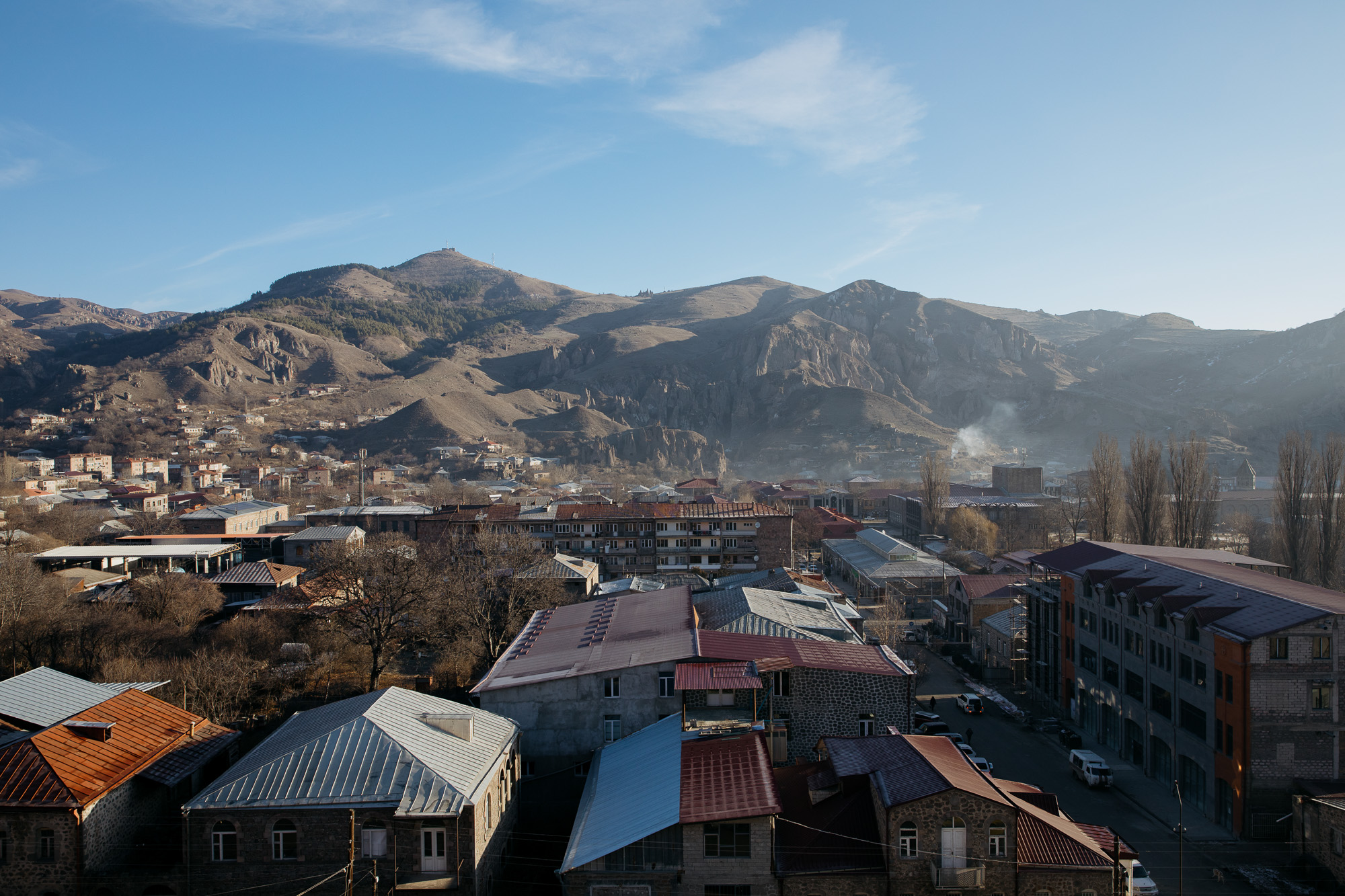
‘Locals explained that Azerbaijani soldiers often shoot in the air to scare civilians’, says Hermine. ‘When they started shooting, my colleague and I stopped and I told her “I can’t be here anymore, let’s leave”. I realised that I can’t work in such places.’
Hermine says that in the beginning, her condition was worse because of a sense of shame, because, according to her, many residents of Nagorno-Karabakh and journalists who worked there throughout the war had a harder time, and many lost loved ones.
‘My psychologist said that I was [objectively] fine, because both my ex-husband I had returned alive and unharmed after going to the war zone. I have come to terms with the fact that what happened has become part of my life. I’m just trying to change my attitude about it’.
Her experience made Hermine even more of a proponent of peace. The horror of war, and the faces of frightened people who dreamed of a normal life, motivate her to speak and do more for peace to finally be established, Hermine says.
‘It makes me angry when people say “I want peace, but…” You can’t say that and add some nonsense after the “but”. A person should say “I want to live in peace. What can I do to help establish it?’
‘During the war, I added many Azerbaijanis as friends on social media and deleted many others. Because war shows who people really are. After 2020, I have really good friends in Azerbaijan and I really appreciate our friendships’.
Hermine likes to tell her friends from Armenia about her Azerbaijani friends, and when she finds herself abroad, where the front line no longer separates Armenians and Azerbaijanis, she tries to introduce everyone to each other.
‘If I see someone from Armenia and someone from Azerbaijan, I always say to them, “Hey, you are from Armenia, and you are from Azerbaijan, say hello to each other!” ’
Allan and Raphael survived, and Hermine was in touch with them for a while. Allan, who was severely wounded in Martuni, was treated for a couple of years. Rafael recovered faster and he went to Ukraine to cover the war. Hermine says that she is proud of him, but she herself would never go to a war zone again.
‘I don’t want to see war anymore. I don’t know what peace is and I want to find it, I want a normal life.’
[Read on OC Media: War from behind the lens: conflict reporting as an Azerbaijani IDP]
All place names and terminology used in this article are the words of the author alone, and may not necessarily reflect the views of OC Media’s editorial board.








